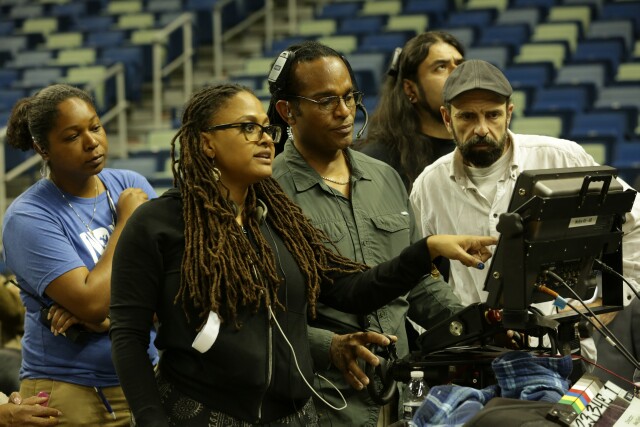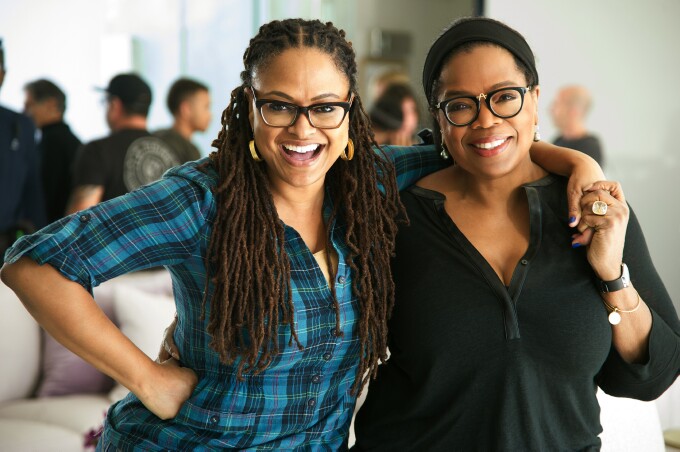Ava DuVernay Reflects on Hiring Only Women Directors to Helm "Queen Sugar" -- Exclusive On-Location Interview

Vacherie, Louisiana -- Ava DuVernay pitches forward in her director's chair. Through tortoiseshell glasses, she watches Kofi Siriboe and Henry G. Sanders (who play Ralph Angel and Prosper, respectively) shoot their final scene of the OWN drama series Queen Sugar, but DuVernay (pictured at top, left) sees all. If that makes her sound a bit like a seer, so be it. DuVernay, the creator, head writer and executive producer of the show, notices absolutely everything on set.
DuVernay directed the two-hour pilot in 2016 and now directs the series' finale. In between, she made good on her promise to exclusively hire women directors for the series' entire run. By the end, there will have been 88 episodes, collectively helmed by 42 women.
Invite job candidates to apply live during the Media and Advertising Community’s Black Talent Outreach Week at MediaVillage.com and AdvancingDiversity.org October 17-20. Register Here.
"It's important to help other women," DuVernay explains. "If we're in a space and we're the only ones there, we need to realize that that's not success. It's just not. If you look around the room and you're satisfied because you're at the table and no one else is there, you are experiencing a quarter of the success that you should feel."
True success is when the room is transformed, she adds, "because you're there not as a token, but as an entryway to more people being fully included. That's what success feels like."

Here on St. Joseph Plantation in mid-July it's 107 degrees (with the heat index) and feels as if hell is blowing air kisses. While everyone else mops their face, DuVernay's makeup remains smudge-free and her demeanor unflappable. If she is breaking a sweat in her chambray shirt and socks pulled over pants to keep biting insects at bay, it doesn't show as she speaks with MediaVillage during an exclusive set visit for the filming of these final scenes.
Although finales can be tearful affairs, DuVernay is sanguine. "I feel satisfied," she says. "I've never worked on anything creatively for this long, and it's been everything that I could have asked for. I wanted for nothing creatively. Tight budgets and all that good stuff. But the bottom line is, it was my vision from start to finish. And how many people could say that?"
Not bad for a series DuVernay thought would not make it to a second season -- never mind seven. It all started when she visited Oprah Winfrey at her Maui home after the two met on Selma. Winfrey had read Natalie Baszile's novel, Queen Sugar, and kept encouraging DuVernay to read it. She thought it would make a fabulous series and that DuVernay was the person to bring it to life.
The series follows the three adult Bordelon children, who return to the family farm when the patriarch dies. His death brings them closer and back to their roots. The Bordelon farm is set at St. Joseph's Plantation, about an hour outside of New Orleans, where nine-foot high sugar beet crops thrive in the muggy climate. It is land that feels hallowed.
The significance is lost on no one that is on this site. A Black woman is the boss over hundreds, most of them people of color, in a location where slaves once labored. Queen Sugar chronicles the challenges faced by a Black family fighting to hold onto this land. The Bordelons have dealt with family feuds, death, birth, the pandemic, and the racial reckoning. Through it all this strong, loving family is the one constant.
And the one constant behind the scenes was that a woman always called, "Action!"
Roughly half of the 42 women who directed on Queen Sugar were first-time directors of scripted TV. Some had directed indie projects but could not break through on television. One such success is showrunner and director Shaz Bennett.
"The only reason I am here is because of Ava," acknowledges Bennett, a story editor on Bosch, and a writer for The Glades."She gave me the opportunity. She creates an environment for directors to succeed."
As a dragonfly hovers beside her, seemingly suspended by the heat, Bennett considers why this set is different. "People talk about the female gaze," she says. "A quality to this show is very female, and that starts with Ava."
This set is more peaceful than many. When DuVernay doesn't like something, she doesn't yell. She hops up, quietly talks to the actors, then returns to her perch. She is reassuring, decisive and positive, but not overly maternal. There's no question who's the boss, and she apologizes when she cuts the line for the gelato truck she provided on this big day.
A couple of behind-the-scenes men, a gaffer and the set decorator, also credit DuVernay for giving them their chance. But it is the women DuVernay was determined to help break through. She reflects on her mentors -- her mom, and Nina Shaw, an attorney, who advised DuVernay about the entertainment business when she was a publicist.
There's also the mentor who showed her what an inclusive and excellent leader looks like.
"What Oprah really taught me was behave the same way behind the scenes as you do in front of the scenes," she says. "If you're going to be a person of integrity out front, and everyone's going to think you are that, you have to do the same thing [in back], and sometimes that's uncomfortable because you can get away with stuff when no one's looking. You can treat people a certain way in private. You can cut corners on the way you treat the crew. You can pay someone less. You can talk behind people's backs. You can do all those things; no one will know.
"But knowing Oprah -- she never does that," DuVernay continues. "Who you see in front is who you see through every aspect of her life. I just thought, 'Wow, what a person!' as I really got to know her. And so, I've tried to be that way."
By all accounts, she succeeded. Women who had talent but not opportunity now have experience.
Being a mentor has also taught her how to manage expectations. "It's intentional to try to give people opportunities that were given to me," DuVernay says. "And I'm aggressive about doing that. But I have had to learn to detach myself from the outcome because everyone is not going to thrive in the opportunity. Everyone is not going to take the opportunity and create another opportunity.
"That's ego to say, 'I'm going to give you this, and I expect these things'," she asserts. "You have to give it freely. It's like a seed that you plant that you walk away from. You trust that it's going to be watered by the rain, and it's going to get sun, and you'll come back, and maybe it's a weed, and maybe it's a flower. And today, in this week that I've been back, you see so many beautiful flowers have blossomed, and that feels gorgeous. But if I came back and [there were weeds], that's okay. That's been a learning process."
The season seven premiere of Queen Sugar will be telecast Tuesday, September 6 at 8 p.m. ET.
Click the social buttons to share this content with your friends and colleagues.
The opinions and points of view expressed in this content are exclusively the views of the author and/or subject(s) and do not necessarily represent the views of MediaVillage.com/MyersBizNet, Inc. management or associated writers.


